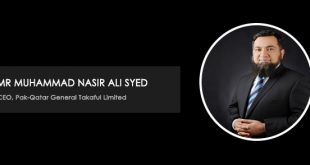Islamic banking has been growing fast to capture 20pc share in the overall banking industry by 2020: Experts
Asia is expected to be the key driver in advancing the growth of the Islamic finance industry. Pakistan is among potential leaders of Islamic finance with huge Muslim population of over 180 million. Although, Islamic banking in Pakistan is growing but there is still a lack of Islamic banking professional. There is dire need to produce high quality bankers required for the promotion and development of Islamic finance in the country.
Pakistan, with more than 95 percent of Muslim population, and a constitutional obligation of ensuring a Riba-free economic system, has had a favorable response to Islamic finance. Pakistan is amongst the pioneers of Islamic finance as we started planning for nurturing the Shariah compliant financial system way back in 1970s, and made a bold attempt in 1980s to bring the whole banking and financial system in conformity with Shariah principles.
Experts believe that with the passage of time, substantial part of the banking will go Islamic as it carried minimum risk. Islamic banks had huge potential to finance small and medium enterprises (SMEs), agriculture and infrastructure.
As per estimates, assets of the global Islamic banking industry would reach $5 trillion by 2020 from about $1.8 trillion at present. Financial experts told PAGE that the share of Islamic banking in Pakistan’s overall banking industry is currently at 10 percent, which would touch 15 percent by 2018. According to them, Islamic banking has been growing at an annual rate of 30 percent and may double its share by 2020.
Islamic financial institutions are presently catering to most of the financial services needs of various sectors of the economy. Islamic banking is currently spread across 80 districts of the country with a network of 1200 branches offering Shariah compliant products and services. Islamic banking assets presently constitute almost 10 percent of the overall banking system in the country while in terms of deposits the share is above 10 percent.
Under Islamic system, not only the prevalence of re-distributive instruments such as zakat, waqf (endowment) and sadqaat (charity) could play a vital role towards broad-based development and poverty alleviation but characteristics such as equity financing could also lead to the same objective, experts said.
“Equity financing enables Islamic finance to cater to needs of unconventional but strategic sectors such as small and medium enterprises (SMEs), agriculture and low-income housing,” they said, adding: “Like many other jurisdictions, the penetration of banking industry and especially of Islamic banks to these sectors is very low in the country.”
They further said there is a pressing need, to open up avenues for Islamic banks by ways of asset creation and liquidity management. That is the only way the industry is going to develop further in the country.
Total deposits held by Islamic banks in Pakistan have registered an impressive growth in recent years, but the challenge facing this industry is on the front of asset deployment. If better opportunities were available there, expansion plans could be materialized.
The penetration of Islamic banks in other countries is significantly higher than in Pakistan. In Malaysia, this number stands at 24 percent, in Kuwait it is over 40 percent, in the United Arab Emirates 22 percent of the banking sector is occupied by Islamic banks, while in Saudi Arabia the entire banking sector is on the verge of turning over completely to Islamic mode,” pointed out the Islamic banking expert, adding that in Pakistan this number is still about 10 percent. Pakistan has one of the world’s largest Muslim populations, so this is a huge market. All that is needed are the right tools that are in line with religious considerations, and this sector can boom within the next few years, experts said.
Experts urged banking sector regulators across the Muslim world to work towards providing an enabling infrastructure; along with regulations that allow Islamic banks to expand their array of product offerings. In terms of business finance, Islamic banks can provide some solutions like Murabaha for export financing, but cannot lend for working capital requirements. So a business will not receive end-to-end services like it could receive from the conventional banks.
Experts believe that Islamic banking has been growing fast to capture 20 percent share in the overall banking industry by 2020. Presently, five full-fledged Islamic banks, one Islamic banking subsidiary and 17 conventional banks with dedicated Islamic banking windows are operating with over 1,700 branches spread all over the country.
If Islamic banks are going to mobilize a corps of potential depositors who were shy of the formal banking system due to its interest-based nature, then they can be a positive force promoting financial inclusion. Likewise, if they can expand lending to agriculture and small- and medium-size enterprises, they can also play a positive role by bringing the benefits of modern credit systems to sectors of the economy long excluded by conventional banking.
 PAGE Blog Business Weekly Magazine
PAGE Blog Business Weekly Magazine

